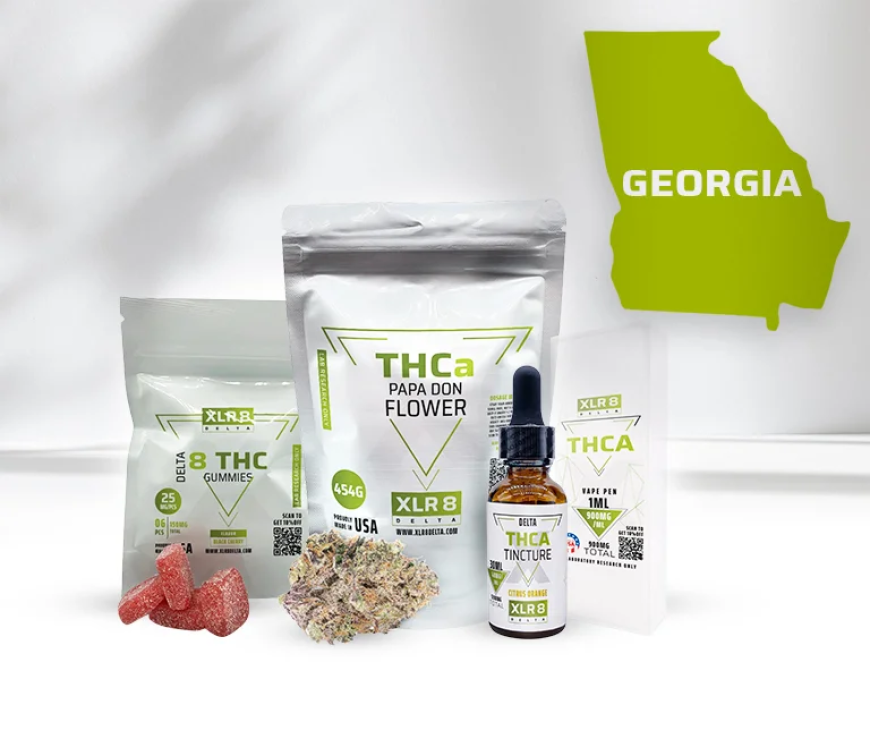THCA Explained: Benefits, Effects, and Legal Status in Georgia
THCA is an exceptional compound with immense untapped therapeutic potential. From its role in reducing inflammation to protecting the nervous system

What is THCA? A Comprehensive Look at Tetrahydrocannabinolic Acid
Tetrahydrocannabinolic acid (THCA) is a non-psychoactive cannabinoid found abundantly in raw and freshly harvested cannabis plants. Unlike THC (delta-9-tetrahydrocannabinol), THCA does not induce a high when consumed in its natural form. Instead, THCA exists as a precursor to THC and transforms into the psychoactive compound through a process known as decarboxylation triggered by heat, light, or time.
THCA vs. THC: Core Differences
|
Property |
THCA |
THC |
|
Psychoactive |
No |
Yes |
|
Found in |
Raw cannabis |
Decarboxylated cannabis |
|
Molecular Form |
Contains a carboxyl group |
Carboxyl group removed |
|
Medical Use |
Anti-inflammatory, neuroprotective |
Pain relief, euphoria |
Unlike THC, THCA interacts weakly with the CB1 and CB2 receptors in the endocannabinoid system. This difference results in a lack of psychoactivity but opens the door to therapeutic potential.
Therapeutic Benefits of THCA
Anti-Inflammatory Properties
THCA has demonstrated significant anti-inflammatory effects, making it a promising candidate for treating conditions such as arthritis, lupus, and inflammatory bowel diseases.
Neuroprotective Effects
Research indicates that THCA may protect brain cells from degeneration, which positions it as a potential treatment for neurodegenerative diseases such as Alzheimer’s, Parkinson’s, and Huntington’s disease.
Antiemetic Potential
Preliminary studies suggest that THCA would reduce nausea and vomiting, especially in cases related to chemotherapy or chronic illness.
Antiproliferative Activity
Emerging research shows that THCA may inhibit the growth of certain cancer cells, although more clinical studies are needed.
Appetite Stimulation
Though not as potent as THC in increasing appetite, THCA may offer a non-intoxicating alternative for patients suffering from appetite loss due to chronic illness.
How THCA Is Consumed
-
Raw Juicing: Fresh cannabis leaves and flowers can be juiced to retain THCA.
-
Tinctures: Cold-extracted to preserve THCA without converting it into THC.
-
Capsules: Offer pre-measured THCA content without psychoactive effects.
-
Topicals: Applied to the skin for localized anti-inflammatory benefits.
Avoid smoking or vaping THCA-rich products if the goal is to retain its raw, non-psychoactive form, as heat will convert it to THC.
THCA for Sale: What to Know Before You Buy
As consumer demand rises, THCA for sale is becoming increasingly common in dispensaries and online stores. However, buyers must ensure the following:
-
COA Certification: Always request a Certificate of Analysis (COA) verifying THCA purity and absence of contaminants.
-
Sourcing: Choose suppliers who use organic farming practices and proper extraction methods.
-
Storage: Keep products in cool, dark conditions to prevent decarboxylation.
-
Usage Intent: Be clear whether you want psychoactive effects (requiring decarboxylation) or therapeutic benefits (requiring raw THCA).
Is THCA Legal in Georgia?
Legal Standing of THCA in Georgia
The legality of THCA in Georgia hinges on its classification under state and federal law. As of now:
-
Federal Law: THCA derived from hemp (containing less than 0.3% THC) is federally legal under the 2018 Farm Bill.
-
Georgia Law: Georgia aligns with federal regulations, which means THCA is legal in Georgia as long as the final product remains compliant with THC thresholds.
However, possession of THCA that decarboxylates into THC above legal limits may result in criminal liability. Consumers must purchase and use THCA products responsibly, ensuring that any heat application doesn't push them outside legal compliance.
THCA Testing and Labeling Requirements
Products labeled with THCA must clearly state:
-
THCA content in milligrams
-
Total THC potential after decarboxylation
-
Batch number and expiration date
-
Independent lab testing results
Improper labeling may mislead consumers and create legal gray areas, especially in states like Georgia where cannabis laws are tightly regulated.
THCA vs. CBD and Other Cannabinoids
|
Cannabinoid |
Psychoactive |
Anti-inflammatory |
Neuroprotective |
Legal in Georgia |
|
THCA |
No |
Yes |
Yes |
Yes |
|
THC |
Yes |
Yes |
Limited |
Limited (Medical Only) |
|
CBD |
No |
Yes |
Yes |
Yes |
|
CBN |
Mild |
Moderate |
Yes |
Yes |
Final Thoughts
THCA is an exceptional compound with immense untapped therapeutic potential. From its role in reducing inflammation to protecting the nervous system, it stands as a powerful cannabinoid in raw form. With THCA for sale across compliant retailers and growing awareness of its non-psychoactive benefits, more individuals are exploring THCA as a legal, health-focused alternative to THC.
As long as THCA is legal in Georgia under the 0.3% THC threshold, residents can responsibly incorporate it into wellness routines—whether through raw juicing, tinctures, or capsules. Always verify product legality, purity, and storage requirements before purchasing.

 Jimmybrown1080
Jimmybrown1080